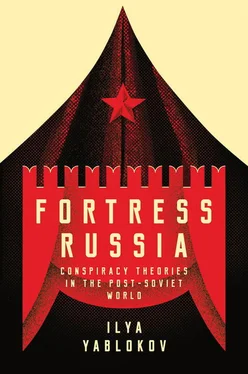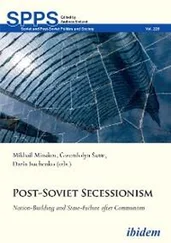Shevchenko has a two-fold goal when he points to the Caucasus’s unique role in the process of Russian nation-building. On the one hand, he delegitimizes the arguments of isolationist Russian nationalists, whose idea of separation from the Caucasus has gained popularity since the mid 2000s (Markedonov, 2013). In his view, calls for separation come from the same ‘fifth column’ within Russia which devastated the great country in 1991. According to this logic, Russian nationalists who advocate the separation of the Northern Caucasus from the Russian Federation cannot be Russian patriots as they support the aims of Russia’s enemies. On the other hand, Shevchenko’s admiration for the uniqueness of the Caucasus boosts his popularity among the elites of the North Caucasian region. When addressing these elites, Shevchenko stresses their region’s great past and the fact that most of the cultures in the North Caucasus are descended from ancient civilizations (Shevchenko, 2013b).
As Shnirel’man (2006) notes, the idea of ancient ancestry played a key role in shaping the nationalist discourse of the North Caucasian republics as far back as the Soviet period and has been actively developed by local intellectual elites since the Soviet collapse. By supporting this approach, Shevchenko can reinforce the notion of Russia’s greatness and claim that the great histories of individual nations within Russia combine to strengthen Russian statehood. Regarding the situation in the North Caucasus, Shevchenko utilizes conspiratorial notions and emphasizes the West’s key role in inciting interethnic conflicts. As he puts it: ‘All attempts to present the Chechen conflict as a conflict between the Chechens and the Russians, between Chechnia and Russia, originate from Russia’s mortal enemies, who wish for [Russia’s] collapse and destruction… This is my sincere conviction’ (Samsonova and Shevchenko, 2009).
The attempt to explain interethnic unrest in post-Soviet Russia in terms of conspiracy is a recurring pattern in Shevchenko’s works. Because of his reputation as an expert on interethnic issues, Shevchenko is approached by the media every time an interethnic conflict in Russia breaks out. This allows him to promote a conspiratorial reading of the event to the public and to shape public perception of the conflict’s causes. For instance, when, in July 2013, social unrest in Pugachev was triggered by a domestic fight between two men, one of whom was of Chechen origin, Shevchenko represented the conflict as part of a broader campaign to destroy Putin’s regime and bring down Russia. In his view, the event had been planned and carried out conjointly by opposition politicians, the media and sociologists who were allied to them; the sociologists apparently confirmed to journalists the existence of strong public support for the idea of separating the North Caucasus from Russia just after the conflict flared up and thus provided a basis for the anti-Caucasian rhetoric (Fel’gengauėr and Shevchenko, 2013).
Despite his use of conspiracy notions in his public speeches, Shevchenko attempts to tailor his arguments to the real social and political challenges that confront post-Soviet Russian society; this means that he positions himself at the centre, rather than the margins, of political discourse. His populist conspiratorial utterances refer to anonymous groups and individuals allegedly responsible for Russia’s social problems. In his description of the socio-economic environment in the North Caucasus, Shevchenko refers to the rampant corruption and violence of the law enforcement agencies against residents of the region. Similarly, he traces the sources of interethnic conflicts in other regions of Russia back to the criminal character of political elites, whom he regularly accuses of corruption (Shevchenko, 2013a).
Quite often, Shevchenko refuses to name the exact members of the political elite whom he accuses of conspiracy, and changes his opinion whenever he feels the situation requires this. He presents himself as an opponent of the government by means of critical remarks about its policies in the North Caucasian region. However, he was a member of the Presidential Council for Interethnic Relations, established in 2012 and hosted personally by Putin. Moreover, Shevchenko played an active part in the coalition of pro-Putin forces during the 2012 presidential elections and supported the Moscow Mayor, Sergei Sobianin, during his electoral campaign in 2013 (Azar and Shevchenko, 2013), even though the mayor’s campaign was framed by anti-migrant narratives, including statements levelled against the North Caucasus (Arkhipov and Kravchenko, 2013).
Shevchenko also regularly criticizes the Russian opposition and its alleged supporters abroad. He has argued that in the 1990s the USA established a semi-colonial regime in Russia (Pozner and Shevchenko, 2009), and that the signing of the Belovezha Accords in 1991, that destroyed the USSR, provided the means to set up an ‘oligarchic tyranny’ supported by corrupt journalists and politicians working closely with the West (Shevchenko, 2011a). Shevchenko contrasts the comparative socio-economic stability of the Putin regime with the oligarchic regime of the 1990s. In Shevchenko’s view, Putin’s regime symbolizes a return to independent decision-making in domestic and foreign policy, which makes it possible for the greatness of the lost empire and its economic stability to be restored (Shevchenko, 2011b).
Shevchenko depicts the West as a unified entity in which many citizens embrace neoliberal views which he describes as ‘criminal in nature’. It should be noted that his perception of the West has changed since he emerged as a public intellectual in the mid 2000s. Perhaps this relates to the changing focus of the Kremlin’s political discourse in this period. In 2004, in response to interventionist US policies in the Middle East, Shevchenko called for a union with Europe against US domination (Buntman and Shevchenko, 2004). However, by the end of the 2000s in his speeches he was portraying the West as a single hostile entity. In support of Putin’s turn away from the USA and Western Europe during his third presidential term, Shevchenko published an article with the telling title We are not Europe? And thank God! ( My ne Evropa? I Slava Bogu! ), in which he drew a clear distinction between Russia and the West: ‘There is a growing feeling that most Western people belong to a different humanoid race from us’ (Shevchenko, 2013c). Shevchenko insisted that Russia had to defend herself from the corrupt spirit of neoliberal thought, which was focused solely on consumption and sexual promiscuity; in contrast, Russia’s adherence to traditional values would save the world.
Like Narochnitskaia, then, Shevchenko combined demonization of the USA with the negative image of a so-called ‘liberal opposition’ alien to the Russian nation. This opposition, funded by the USA, was relentless in its attempt to create numerous nation-states on the territory of Russia. US policies were allegedly carried out by disloyal ‘fifth columnists’ in Russia, who possessed dual citizenship and lacked a sense of national identity (Shevchenko, 2012a). The reference to dual citizenship serves as another marker of the otherness of the opposition. Shevchenko’s attempt to divide the world in this way was strengthened by reference to anti-Semitic conspiracy theories which were popular in the Imperial and, even more, in Soviet times, and which encouraged fear of a small but powerful group of people within the state.
This use of anti-Jewish attitudes in his speeches and articles marks Shevchenko out from other public intellectuals who are involved in the dissemination of conspiracy discourse and loyal to the Kremlin. As a self-proclaimed spokesperson for Muslims in Russia, Shevchenko provides his audience with a particular interpretation of the Middle East conflict which paints Israel as a ‘fascist state’ committing genocide against the Palestinians. In trying to promote solidarity between Muslims in Russia and in the Middle East based on a common hatred of Jews, Shevchenko utilizes the narratives traditional to anti-Zionist conspiracy discourse which is popular in the Middle East (Pipes, 1998; Gray, 2010). For example, he depicts Israel as ‘a purely virtual state’ which was created by the USA with the sole purpose of achieving global domination in the Middle East (Shevchenko, 2012c).
Читать дальше
Конец ознакомительного отрывка
Купить книгу












